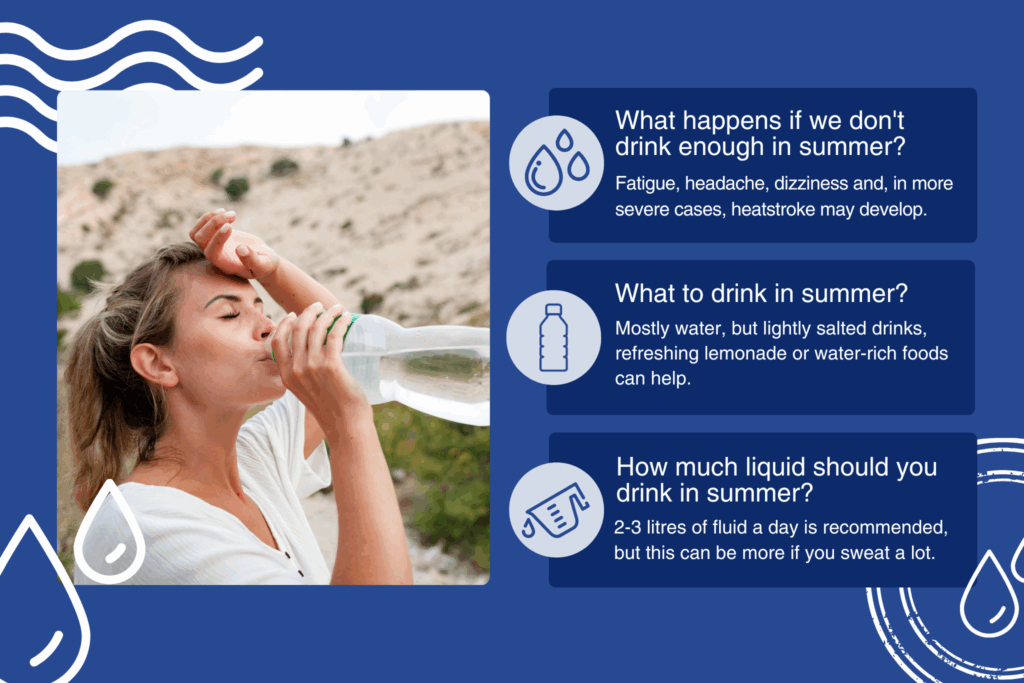The summer heat can be not only uncomfortable but also dangerous if you don’t stay properly hydrated. Our bodies lose much more water than usual – even without us noticing. If this is not replenished in time, dehydration can easily develop due to inadequate hydration, which not only causes fatigue but can also lead to serious health problems.
Why hydration is important in summer?
A large part of our body is made up of water. In hot weather, our body tries to cool itself through increased sweating, which leads to significant loss of water and essential minerals that are excreted through sweat. If we do not properly replenish these, the following symptoms may easily occur:
-
thirst
-
headache
-
fatigue
-
muscle cramps
-
dizziness
-
darker-colored urine
In more severe cases, heat stroke may develop, which can be a life-threatening condition.
During physical activity or sports, the body also loses a greater amount of fluids.
Who is at greater risk of dehydration?
Some groups require special attention during hot weather:
-
Children – They lose fluids more quickly. In young children, small amounts of urine or a dry diaper can be signs of dehydration. For infants, fluid replacement is especially important; a sunken fontanelle may also indicate dehydration.
-
Elderly people – They often have a weaker sense of thirst and may not realize that they are not drinking enough fluids.
-
People with chronic illnesses – Such as those with heart, kidney, or diabetes-related conditions, whose metabolism can more easily become unbalanced.
-
Individuals taking certain medications – For example, diuretics or blood pressure medications.
How much and what should we drink in summer?
There is no one-size-fits-all rule, but in general:
- A daily intake of 2 to 3 liters of fluids is recommended – For adults doing lighter work, about 2 liters per day is usually sufficient, but more fluids are needed in hot weather or during physical activity.
- Water is the best choice. Tap water is also a high-quality, healthy, and mineral-rich alternative that can be safely consumed. In addition, lightly salted drinks or lemonade can help. Healthy, natural beverages like fresh fruit juices or diluted fruit drinks are also recommended. Fruits, vegetables, and fluid-rich foods such as soups contribute to daily fluid intake as well.
- Avoid alcohol, sugary or sweetened drinks, and beverages high in sugar and caffeine – these are not healthy and do not support proper hydration. In fact, they may even dehydrate the body further.
The role of minerals in hydration
In the summer heat, our bodies lose not only water but also precious minerals through sweating. Of these, potassium, magnesium and sodium are particularly important for the body to function properly. Minerals help to maintain fluid balance, support muscle and nerve function and help our bodies to regulate temperature effectively.
When drinking fluids, it’s worth choosing not just plain water but also mineral-rich drinks. It is best to include mineral water, freshly squeezed fruit juices or vegetable juices in your daily hydration. These not only hydrate but also replenish minerals lost through sweating. Especially in the hot summer months, make sure you drink a variety of drinks and occasionally include a magnesium or potassium-rich drink in your glass. This will ensure that your body gets all the minerals it needs on hot days.
How to check your hydration?
Staying properly hydrated is crucial in the summer heat, so it’s worth checking regularly that you’re getting enough fluids.
One of the best ways to do this is to look at the colour of your urine: if it’s light, straw yellow or translucent, you’re generally well hydrated. If it’s darker in colour, it means you need to drink more water.
You should also pay attention to your thirst – if you are thirsty, drink water and don’t wait until your next meal. The condition of your skin can also be a tell-tale sign: if it feels dry and tight, it could be a sign of dehydration.
In hot summer weather, it is particularly recommended to check these signs every hour and replenish fluids if necessary. This will help prevent dehydration and keep your body functioning properly in the hottest weather.
Useful tips for staying hydrated
- Don’t wait until you’re thirsty – it’s a good idea to drink before you feel thirsty, especially before physical activity or being outdoors, and drink regularly in small portions
- Eat vegetables and fruit with high water content – like cucumbers, melons or tomatoes
- Watch your fluid intake throughout the day and check the colour of your urine – if it’s dark, it could be a sign of dehydration
- Stay in cool places if you can and avoid strenuous exercise in the heat
Prevention is the best defence
The summer months put increased strain on the body, so it’s especially important to be mindful of hydration during the summer. It’s not just about feeling more comfortable in the heat – lack of adequate hydration can have serious physical and mental consequences. Dehydration can occur unpredictably and quickly, especially in those with more sensitive bodies, such as children, the elderly or the chronically ill.
Conscious hydration is not difficult, but it does require daily attention. Stay hydrated, drink regularly, choose a variety of mineral-rich drinks, and remember that the vegetables and fruit you eat at mealtimes also help to keep you hydrated.
Don’t wait until the body sends an “alarm” – prevent problems instead! A simple habit like drinking water regularly can help keep you healthy, energetic and safe during the summer days. And that means not just quality of life, but health – even in the long term.
Staying hydrated in summer is not just good advice – it can be a lifesaver. Our bodies tell us every day if something is wrong, we just need to be able to spot the signs. Look out for yourself and others, especially on the hottest days!



